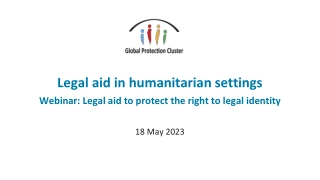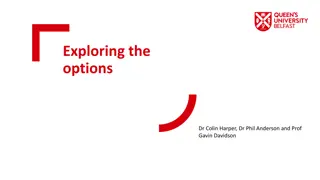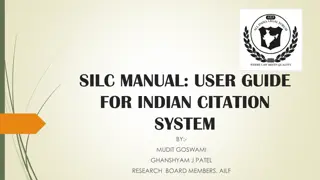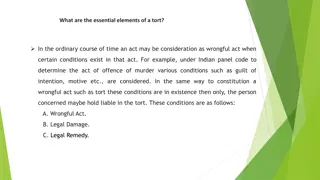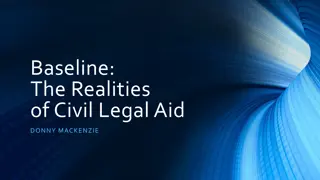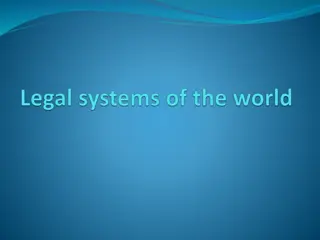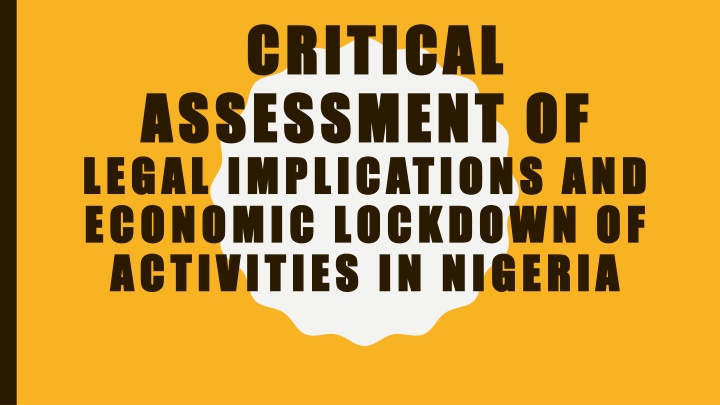
Economic and Legal Implications of Lockdown Activities in Nigeria Amid COVID-19 Outbreak
Explore the critical legal and economic repercussions of implementing lockdown measures in Nigeria due to the COVID-19 pandemic, delving into global implications and challenges faced by various countries.
Download Presentation

Please find below an Image/Link to download the presentation.
The content on the website is provided AS IS for your information and personal use only. It may not be sold, licensed, or shared on other websites without obtaining consent from the author. If you encounter any issues during the download, it is possible that the publisher has removed the file from their server.
You are allowed to download the files provided on this website for personal or commercial use, subject to the condition that they are used lawfully. All files are the property of their respective owners.
The content on the website is provided AS IS for your information and personal use only. It may not be sold, licensed, or shared on other websites without obtaining consent from the author.
E N D
Presentation Transcript
CRITICAL CRITICAL ASSESSMENT OF ASSESSMENT OF LEGAL IMPLICATIONS AND LEGAL IMPLICATIONS AND ECONOMIC LOCKDOWN OF ECONOMIC LOCKDOWN OF ACTIVITIES IN NIGERIA ACTIVITIES IN NIGERIA
In December 2019, a cluster of pneumonia cases from an unknown virus surfaced in Wuhan, China. Based on initial laboratory findings, the disease named Coronavirus disease 2019 (abbreviated as COVID-19), was described as an infectious disease that is caused by severe acute respiratory syndrome coronavirus 2.
The COVID-19 outbreak has since spread to about 196 countries and territories in every continent and one international conveyance across the globe. While there are ongoing efforts to curtail the spread of infection which is almost entirely driven by human-to-human transmission, it has accounted for over 400,000 confirmed cases with over 18,000 deaths
Beyond the tragic health hazards and human consequences of the COVID-19 pandemic, the economic uncertainties, and disruptions that have resulted come at a significant cost to the global economy. The United Nations Trade and Development Agency (UNCTAD) put the cost of the outbreak at about US$2 trillion in 2020.
The virus is also taking its toll on health facilities and infrastructures across the globe. Italy is currently the largest affected country with a number of deaths surpassing China, since the outbreak of coronavirus. be more devastating is the fact that the economic pains that accompanied the virus might not go away soon as envisaged.
Across northern Italy, the virus has pushed the countrys National Health Service to a breaking point, emphasizing the test that other countries, especially developing and low-income countries, might face in their approach to contain the virus spread. Most hospitals and health facilities that could not handle the hazards are resulting to operating below their capacity by taking a few regular health-related cases or shutting down. What could be more devastating is the fact that the economic pains that accompanied the virus might not go away soon as envisaged.
Apart from the lose of life which represent variable manpower the economic lockdown has caused a trade stall goods from intercountry are not easily accessible Due to these there is a possibility for increase in hording `
Legally From personal view I have notice that there has been infringement on humans rights by military men and police officials who have been mandated to enforce this law they have show the use of excessive force as a means of control.
Technology can and should play an important role during this effort to save lives, such as to spread public health messages and increase access to health care. However, an increase in state digital surveillance powers, such as obtaining access to mobile phone location data, threatens privacy, freedom of expression and freedom of association, in ways that could violate rights and degrade trust in public authorities undermining the effectiveness of any public health response. Such measures also pose a risk of discrimination and may disproportionately harm already marginalized communities.
These are extraordinary times, but human rights law still applies. Indeed, the human rights framework is designed to ensure that different rights can be carefully balanced to protect individuals and wider societies. States cannot simply disregard rights such as privacy and freedom of expression in the name of tackling a public health crisis. On the contrary, protecting human rights also promotes public health. Now more than ever, governments must rigorously ensure that any restrictions to these rights is in line with long-established human rights safeguards.


